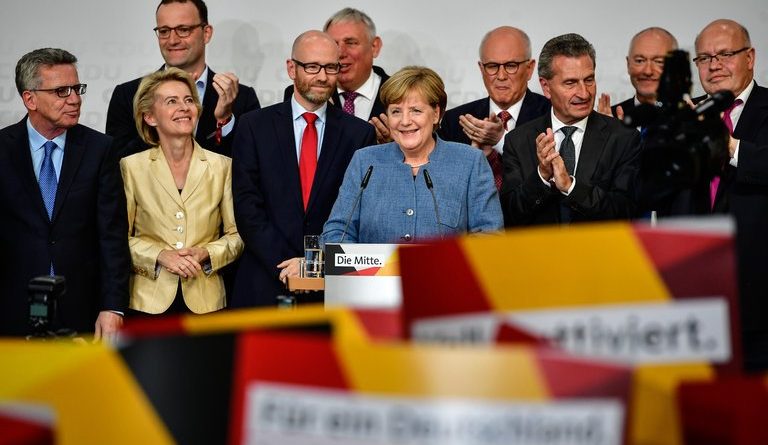Angela Merkel Makes History in German Vote, but So Does Far Right
BERLIN — Angela Merkel won a fourth term as chancellor in elections on Sunday, placing her in the front ranks of Germany’s postwar leaders, even as her victory was dimmed by the entry of a far-right party into parliament for the first time in more than 60 years, according to preliminary results.
The far-right party, Alternative for Germany, or AfD, got some 13 percent of the vote — nearly three times the 4.7 percent it received in 2013 — a significant showing of voter anger over immigration and inequality as support for the two main parties sagged from four years ago.
Ms. Merkel and her center-right Christian Democrats won, the center held, but it was weakened. The results made clear that far-right populism — and anxieties over security and national identity — were far from dead in Europe.
They also showed that Germany’s mainstream parties were not immune to the same troubles that have afflicted mainstream parties across the Continent, from Italy to France to Britain.
“We expected a better result, that is clear,” Ms. Merkel said Sunday night. “The good thing is that we will definitely lead the next government.”
She said that she would listen to those who voted for the Alternative for Germany, or AfD, and work to win them back “by solving problems, by taking up their worries, partly also their fears, but above all by good politics,” she said.
But her comments seemed to augur a shift to the right and more of an emphasis on controls over borders, migration and security.
Despite her victory, Ms. Merkel and her conservatives cannot rule alone, making it probable that the chancellor’s political life in her fourth term will be substantially more complicated.
The shape and policies of a new governing coalition will involve weeks of painstaking negotiations. Smiling, Ms. Merkel said Sunday night that she hoped to have a new government “by Christmas.”
The center-left Social Democrats, Ms. Merkel’s coalition partners for the last four years, ran a poor second to her center-right grouping, and the Social Democrats announced Sunday evening that the party would go into opposition, hoping to rebuild their political profile.
But the step would also make sure that the AfD, stays on the political sidelines and does not become the country’s official opposition.
The Alternative for Germany nonetheless vowed to shake the consensus politics of Germany, and in breaking a postwar taboo by entering parliament, it already had.
Alexander Gauland, one of AfD’s leaders, told party supporters after the results that in parliament: “We will go after them. We will claim back our country.”
To cheers, he said: “We did it. We are in the German parliament and we will change Germany.”
Burkhard Schröder, an AfD member since 2014 from Düsseldorf, was ecstatic. “We are absolutely euphoric here,” he said. “This is a strong victory for us that has weakened Angela Merkel.”
Read the rest of the article….

